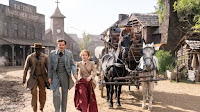Ever since it was published in 1872, Jules Verne’s great adventure novel has delighted readers with its cavalcade of cameos for faded movie stars. At least that is the impression you would get from the Oscar winning 1956 movie. Regrettably, the cast of hundreds has not aged nearly as well as that of It’s a Mad, Mad, Mad, Mad World. In fact, the David Niven vehicle’s critical stock has declined steadily over time, greatly lowering the stakes for subsequent adaptations. Series creators Ashley Pharoah & Caleb Ranson take another crack at Verne’s globetrotting yarn Around the World in 80 Days, which premieres tomorrow night on PBS.
Do not panic. This series only runs eight episodes, rather eighty, averaging about ten days per installment. As is often the case, the first is the slowest. In this case, it is laboriously slow, but Steve Barron (director of the first four episodes and the finale) soon picks up the pace. Phileas Fogg is not a bad chap, but he leads an incredibly safe and dull existence. In time, we learn that things might have turned out differently for Fogg, but in any event, here he is: reading his newspaper in his usual armchair at the Reform Club. However, a chance discussion of an article discussing the possibility of circumnavigating the globe in eighty days leads to a hastily thought-out wager with his bullying “friend” Nyle Bellamy.
To accompany him, Fogg hires Passepartout, a former Reform Club waiter with a dodgy past, to sub for his aging valet. Whether he likes it or not, aspiring journalist Abigail Fix Fortescue will also follow his progress. She happens to be the daughter of her editor, Bernard Fortescue, Fogg’s friendlier friend at the club. Initially, Fogg wants nothing to do with her, but the three travelers inevitably must rely on each other to overcome the obstacles in their way—some of which will be the work of a thug hired by Bellamy, who faces bankruptcy if he does not win the 20-thousand-pound wager.
David Tennant is painfully nebbish and neurotic as Fogg, but that eventually makes his growth in later episodes somewhat rewarding. However, his Fogg really gets the short end of the stick. Instead of bringing Aouda home from India to be his wife, the only romance kindling in this series is the Tracy-and-Hepburn attraction shared by Fix (as she prefers to be called) and Passepartout. Presumably, the idea of saving Aouda from her late husband’s funeral pyre would be a non-starter in these woke times, so Fogg’s stopover in India merely involves his reluctant attempt to reunite an Indian Army deserter with his fiancée.
Ibrahim Kona and Leonie Benesch are okay as Passepartout and Fix, but their characters’ melodramas are totally forced and quickly grow tiresome. Ironically, one of the best performances comes from Peter Sullivan, playing the dishonorable Bellamy as a manipulative cad, but one not without guilt. A number of guest stars also shine, like Lindsay Duncan, who is terrific as Lady Jane Digby, a scandalous English lady, who married a Sheik. Perhaps the best work comes from Gary Beadle, who steals episode 7 as Bass Reaves, a former slave now serving as a U.S. Marshall, who must bring in a wanted leader of the Ku Klux Klan (there is some respectable western shoot-out action too).
Pharoah & Ranson include all the classic elements (the hot air balloon, trains aplenty) and slyly references Verne and 20,000 Leagues Under the Sea at various points. There are exotic locales and villains as well as decent forward momentum, but it needed more of an ever-so British stiff-upper-lip. Everybody here is way too interested in expressing their feelings when there is 20K pounds to be won. Still, it would be interesting to see the second season the conclusion clearly teases. Inconsistent but still recommended as some late 19th Century adventuring, Around the World in 80 Days starts tomorrow night (1/2) on PBS.

